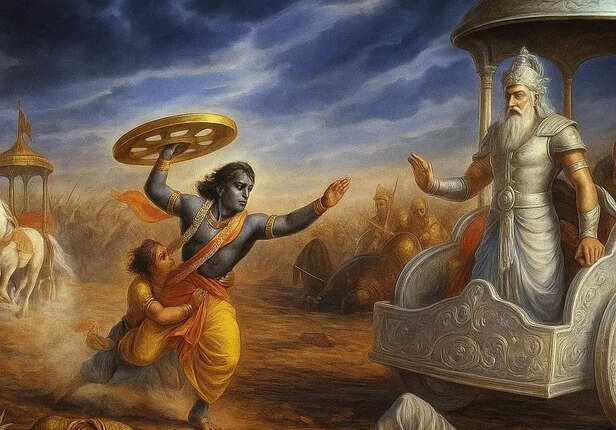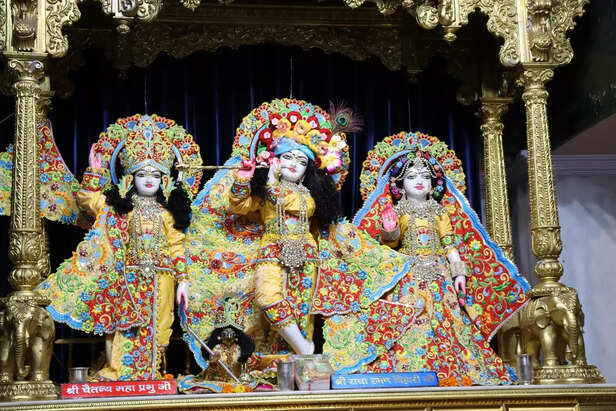Gita’s Wake-Up Call to the Self-Obsessed Mind
Noopur Kumari | May 16, 2025, 15:00 IST
( Image credit : Timeslife )
We scroll endlessly, chase validation, and build a world around “me”—yet peace slips through our fingers. Why? The Bhagavad Gita whispers a truth we keep ignoring: the self-obsessed mind is its own enemy. In this eye-opening piece, discover how ego traps us, what Krishna revealed to a lost Arjuna, and how true stillness begins—not with more self-love, but with self-forgetfulness.
The word "I" occurs in every statement in our world. My truth, my life, my suffering, and my success. We frequently forget that we are not the sun that the cosmos revolves around in this echo chamber of our ego. However, this self-obsession trap was forewarned of by the Bhagavad Gita long before Instagram selfies and motivational reels. Not only did Krishna discuss war, but he also served as a wake-up call to Arjuna's self-obsessed mentality as he stood on the battlefield, drowning in his own anxieties and uncertainties. Today, we must all heed this message before our egos lead to our demise.

We're trained to strive for success, share it online, and then wait for approval. We begin to think that our own bubble is the sole reality during this cycle. However, the Gita informs us that all suffering stems from this fixation with the ego. When Arjuna had his breakdown, his thoughts, feelings, and anxieties took over. He was gently admonished by Krishna that ego attachment only results in paralysis and not insight. We start to see that we are but a tiny part of a much larger cosmic flow the moment we let go of the "I."

Ahankaar says rather than screams. It leads us to believe that we are correct—always the hero, always the sufferer. According to the Gita, one of the main barriers to spiritual development is ego. By feeding our ego, we cling to our identity, reject criticism, and remain trapped in a never-ending loop of disappointment and expectations. According to Krishna, a knowledgeable person acts with awareness and detachment rather than to prove a point. Ego desires praise. Peace is what wisdom desires. The two can't share a heart.

Arjuna stood paralysed, torn between blood ties and duty, drowning in self-pity. But Krishna didn’t console him. He challenged him: “This isn’t about you, Arjuna. Rise.” That’s the soul of the Bhagavad Gita. In a world obsessed with “Why me?”, Krishna asks us to look deeper: “What is my dharma here?” The Gita teaches us that true peace begins when we let go of ego and step into purpose. Freedom isn’t found in self-glorification—it’s found in surrender. And maybe, just maybe, life isn’t punishing us… it’s positioning us to serve something greater than ourselves.

One of the most soul-shaking truths from the Bhagavad Gita is this: You are not the doer. The self-centered mind craves control—it wants to plan, predict, and perfect everything. But Krishna reminds us that actions flow through the gunas (natural energies), not from ego. Letting go doesn’t mean weakness—it means awakening. When we drop the illusion of control, we drop anxiety, jealousy, and exhaustion. The Gita shows us that peace begins when we become instruments, not masters. True power lies in surrender—and that’s where grace begins to flow.

Most people mistake detachment for coldness or indifference, but the Bhagavad Gita offers a wiser truth. Detachment doesn’t mean disconnecting from life; it means not letting life disturb your inner peace. The self-obsessed mind clings to results, people, and roles that feed the ego. But Krishna teaches us to live like a lotus in muddy water—rooted, active, yet untouched. Real detachment allows you to love fully without control, to work passionately without obsession. It’s not about running away—it’s about rising above. This timeless wisdom is not escape—it’s freedom, and it might be exactly what your restless mind needs.

We often picture leaders as bold, dominant, and always in control. But the Bhagavad Gita flips that idea—true leadership, Krishna shows, begins with humility. While the self-centred mind seeks praise and power, Krishna chose to serve as Arjuna’s charioteer. He didn’t lead with ego—he led with purpose. The Gita teaches us that real strength comes not from controlling others, but from mastering ourselves. When we let go of the need to impress, we unlock the power to inspire. In surrendering the ego, we don’t lose power—we rise above it. That’s where real transformation begins.

The Bhagavad Gita isn’t just a book about ego—it’s a guide to rediscovering who we truly are. It shifts our thinking from “Who am I?” to “Whose am I?”, reminding us we’re not defined by our roles, titles, or social masks. We’re part of something divine—far greater than the small self we obsess over. The Gita gently breaks the illusion of identity and invites the soul to awaken. When ego fades, peace flows naturally. Life stops being a performance and becomes a sacred offering. This transformation is the Gita’s ultimate promise—a path from inner chaos to lasting calm.
We’ve all been Arjuna—stuck in overthinking, obsessed with our emotions, and trapped in our ego’s web. But the Gita offers us a mirror, not a sermon. It doesn’t scold—it awakens. It reminds us that you are not your fears, not your achievements, not your pain. You are the eternal soul behind it all. And the moment you stop chasing your reflection and start listening to Krishna’s call, life doesn’t get easier—it gets deeper. More meaningful. More peaceful.
When ‘I’ becomes silent,
‘He’ begins to speak.
In the death of ego,
The soul learns to breathe."
Explore the latest trends and tips in Health & Fitness, Travel, Life Hacks, Fashion & Beauty, and Relationships at Times Life!
1. I, Me, Myself”—The Modern Mind’s New Religion

girl
( Image credit : Pixabay )
We're trained to strive for success, share it online, and then wait for approval. We begin to think that our own bubble is the sole reality during this cycle. However, the Gita informs us that all suffering stems from this fixation with the ego. When Arjuna had his breakdown, his thoughts, feelings, and anxieties took over. He was gently admonished by Krishna that ego attachment only results in paralysis and not insight. We start to see that we are but a tiny part of a much larger cosmic flow the moment we let go of the "I."
2. The Silent Poison Called Ahankaar (Ego)

Ego
( Image credit : Pixabay )
Ahankaar says rather than screams. It leads us to believe that we are correct—always the hero, always the sufferer. According to the Gita, one of the main barriers to spiritual development is ego. By feeding our ego, we cling to our identity, reject criticism, and remain trapped in a never-ending loop of disappointment and expectations. According to Krishna, a knowledgeable person acts with awareness and detachment rather than to prove a point. Ego desires praise. Peace is what wisdom desires. The two can't share a heart.
3. From Victimhood to Dharma: Gita’s Call to Rise Above

gita
( Image credit : Times Life Bureau )
Arjuna stood paralysed, torn between blood ties and duty, drowning in self-pity. But Krishna didn’t console him. He challenged him: “This isn’t about you, Arjuna. Rise.” That’s the soul of the Bhagavad Gita. In a world obsessed with “Why me?”, Krishna asks us to look deeper: “What is my dharma here?” The Gita teaches us that true peace begins when we let go of ego and step into purpose. Freedom isn’t found in self-glorification—it’s found in surrender. And maybe, just maybe, life isn’t punishing us… it’s positioning us to serve something greater than ourselves.
4. You Are Not the Doer—Gita’s Deepest Truth

puppet strings
( Image credit : Pixabay )
One of the most soul-shaking truths from the Bhagavad Gita is this: You are not the doer. The self-centered mind craves control—it wants to plan, predict, and perfect everything. But Krishna reminds us that actions flow through the gunas (natural energies), not from ego. Letting go doesn’t mean weakness—it means awakening. When we drop the illusion of control, we drop anxiety, jealousy, and exhaustion. The Gita shows us that peace begins when we become instruments, not masters. True power lies in surrender—and that’s where grace begins to flow.
5. Detachment Is Not Coldness, It’s Clarity

woman
( Image credit : Pixabay )
Most people mistake detachment for coldness or indifference, but the Bhagavad Gita offers a wiser truth. Detachment doesn’t mean disconnecting from life; it means not letting life disturb your inner peace. The self-obsessed mind clings to results, people, and roles that feed the ego. But Krishna teaches us to live like a lotus in muddy water—rooted, active, yet untouched. Real detachment allows you to love fully without control, to work passionately without obsession. It’s not about running away—it’s about rising above. This timeless wisdom is not escape—it’s freedom, and it might be exactly what your restless mind needs.
6. True Leadership Begins with Ego Death

Krishan
( Image credit : Freepik )
We often picture leaders as bold, dominant, and always in control. But the Bhagavad Gita flips that idea—true leadership, Krishna shows, begins with humility. While the self-centred mind seeks praise and power, Krishna chose to serve as Arjuna’s charioteer. He didn’t lead with ego—he led with purpose. The Gita teaches us that real strength comes not from controlling others, but from mastering ourselves. When we let go of the need to impress, we unlock the power to inspire. In surrendering the ego, we don’t lose power—we rise above it. That’s where real transformation begins.
7. The Journey from “Who Am I?” to “Whose Am I?

lord-krishna
( Image credit : Pexels )
The Bhagavad Gita isn’t just a book about ego—it’s a guide to rediscovering who we truly are. It shifts our thinking from “Who am I?” to “Whose am I?”, reminding us we’re not defined by our roles, titles, or social masks. We’re part of something divine—far greater than the small self we obsess over. The Gita gently breaks the illusion of identity and invites the soul to awaken. When ego fades, peace flows naturally. Life stops being a performance and becomes a sacred offering. This transformation is the Gita’s ultimate promise—a path from inner chaos to lasting calm.
A Mirror to the Self
When ‘I’ becomes silent,
‘He’ begins to speak.
In the death of ego,
The soul learns to breathe."
Explore the latest trends and tips in Health & Fitness, Travel, Life Hacks, Fashion & Beauty, and Relationships at Times Life!
